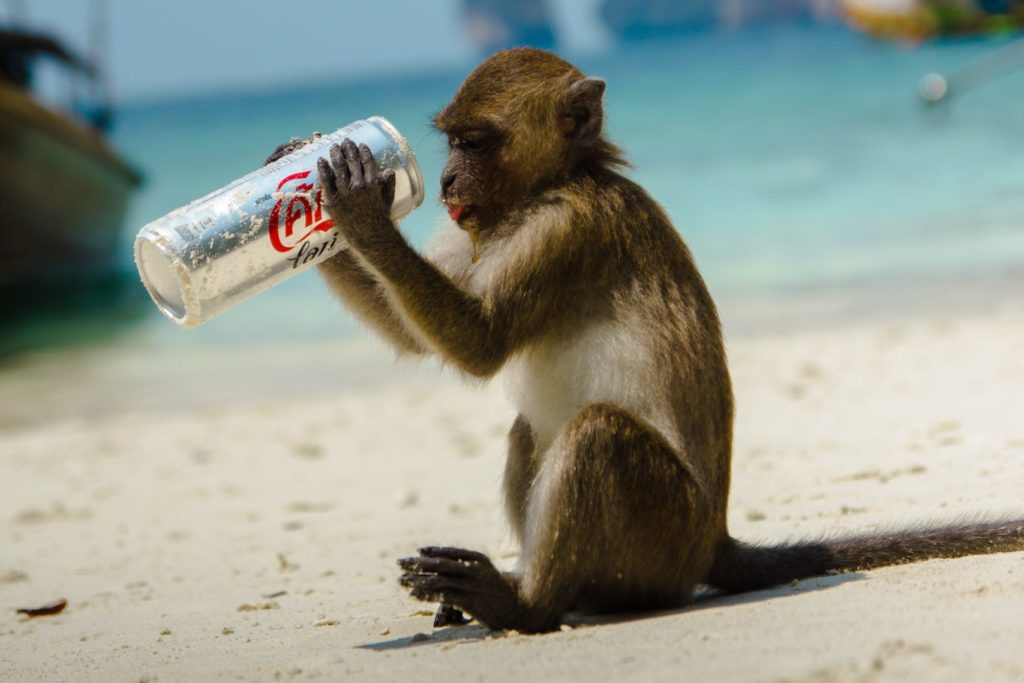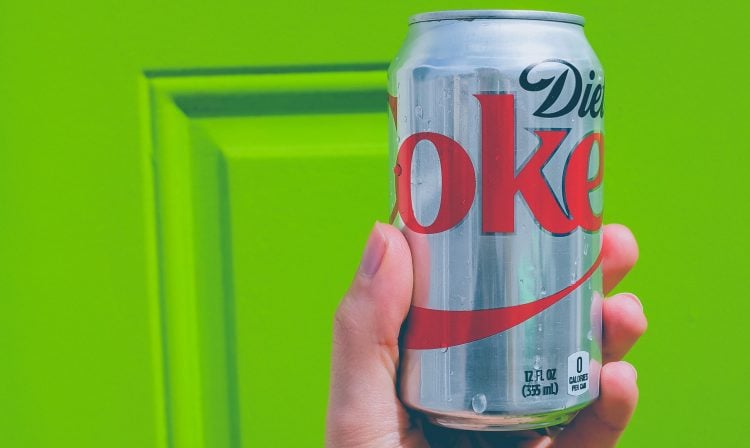Can You Have Diet Drinks on Keto

Diet Soda on Keto | Gut Health | Fat Storage | Cravings | Insulin Response | Weight Gain | Keto-Friendly Drinks | Alcohol | Diet Coke and Ketosis | Conclusion | FAQ | References
There are a lot of confusing and unanswered questions about diet soda on keto.
Is diet soda bad for you? Is diet soda keto? What are diet soda vs. regular soda benefits? Does diet soda on keto help with weight loss? Why do obese people drink diet soda? And why do they consume incredible amounts?
Fortunately, I am bringing clarity to the topic in the following science-backed article.
So, you might have come here because you are sick of drinking plain water to support your low-carb high-fat ketogenic diet.
Therefore, diet soda seems to be a legit alternative – zero grams of net carbs, zero grams of protein, zero calories, and some sodium.
Can You Drink Diet Soda on Keto?
We are talking about synthetically colored carbonated water with artificial sweeteners and other synthetic additives. But non-caloric beverages without added sugar and carbohydrates are keto-friendly – is it that easy?
No. Therefore, I am going to have a more in-depth look at natural and artificial sweeteners to give you the top five evidence-based arguments why diet soda on keto is a bad idea
Moreover, I will propose keto-friendly-beverages you can drink instead. Finally, we will have a look on alcohol, diet coke, and ketosis.

1. Diet Soda on Keto Is Bad for Gut Health
Synthetic sweeteners in diet soda like aspartame, saccharin, sucralose, and others are known to alter your gut microbiome.
They are killing so-called "good" microbes while supporting the overrun of your gut microflora with harmful bacteria (Gundry et al. 2017).
Saccharin, sucralose, and also the natural sweetener stevia are known to change the composition of the gut microbiome (Ruiz-Ojeda et al. 2019).
According to research, a single package of the sucralose-based sweetener Splenda eradicates 50 percent of healthy gut microflora (Abou-Donia et al. 2008).
With this in mind, such a rise of "bad" gut microbes is causing an immunological reaction in the body resulting in fat storage and weight gain with diet soda intake.
Furthermore, there's been an additional artificial sweetener on everyone's lips recently called acesulfame potassium. So, what is acesulfame potassium?
It's the second artificial sweetener besides aspartame in coke zero, while diet coke only uses aspartame. Hence, acesulfame potassium is not the same as aspartame on keto.
Nevertheless, it's as sweet as aspartame and 200 times sweeter than table sugar.
But compared to sucralose, acesulfame K is just one-third as sweet. Given that it's more resistant to heat and acids than aspartame, does that make acesulfame potassium keto?
Certainly not. Instead, acesulfame potassium's side effects are dangerous and it isn't safer than other artificial sweeteners on keto.
Likewise, recent research revealed that acesulfame potassium also alters the gut microbiome. Additionally, it supports body weight gain (Bian et al. 2017).
And the nail in the coffin is that acesulfame potassium on keto might even affect your cognitive brain function (Ibi et al. 2018).
In short, acesulfame potassium is as bad for you as aspartame on keto.
While many people think diet soda supports weight loss, the opposite is true.
Gut Health – Summary
Artificial and natural sweeteners are changing your gut microbiome health for the worse. Consequently, diet soda is bad for you in general.

2. Sweet Taste Is a Fat Storage Signal
From a historical perspective, sweet taste used to be rare. Nature provided sweet taste in the form of ripe summer fruits and honey. Moreover, in medieval times, honey was the only sweetener.
Fruits and honey rich in fructose – a significant driver of insulin resistance in liver cells and obesity – could have been our Stone Age ancestors' ticket for survival.
If they found something sweet, nature made sure that humans ate it.
Not to mention that today's fruits are candy on a tree compared to their ancestral versions. For example, the apples of the middle ages (crap apples) were almost inedible, and wild strawberries used to be way smaller.
The first sugar cane plantations evolved in the days of the crusaders. Since it was a luxury good until the 19th century, sugar was mainly used for medicine and rarely to cook.
Consequently, people didn't eat sweet dishes at all.
For hundreds of thousands of years, sweet taste was seasonal and of limited availability due to natural events.
Therefore, our bodies still realize it as an evolutionary signal for storing fat to survive wintertime. But thanks to artificial sweeteners and sugar, our bodies are experiencing an endless summer.
Since it disturbs its circadian clock, the 24/7 availability of sweet taste is comparable with a jet lag to the human body.
Besides the 24 hours based circadian clock, there's also one tied to the moon cycle representing a sense for seasons (Gundry et al. 2017).
Fruit season used to be vital for survival. But since evolutionary yesterday, we are disrupting the circadian rhythm.
Because we are consuming dietary fructose and sweetened drinks like diet coke all year round, we are gaining weight.
Body Fat – Summary
The sweet taste is an evolutionary signal to the body, stimulating fat storage to survive winter. Since it's not about sugar, non-caloric sweeteners are effectively promoting body fat.

3. Diet Soda Promotes Cravings on Keto
Did you ever ask yourself why we are so sensitive to sweetness and why it seems to be the most addictive taste? An excellent reason is that two-thirds of our taste buds are responsible for sweet taste.
The big caveat to the evolutionary sensitivity to sweetness is that not just sugar molecules but also those of artificial sweeteners bind to the tongue's receptors. In other words, diet soda makes our brain greedy for sweet taste.
Because compared to salty taste, sweetness has a positive feedback system. It's more likely to get you addicted. The more you consume, the more you crave.
If the brain awaits sweetness and therefore, glucose, but it gets non-caloric sweeteners, it overcompensates in more appetite and cravings for sweet food (Yang 2010).
Moreover, functional magnetic resonance imaging studies showed that sucralose does not fully activate the brain's reward center like glucose does (Smeets et al. 2005).
Consequently, the brain strives towards the full activation of the reward center, making it more likely to develop cravings and a bad habit of eating sweets.
With that in mind, researchers have also found that exchanging caloric beverages with diet soda does not lead to overall calorie reduction due to increased appetite (Bellisle et al. 2007).
Recently scientists at Yale University found that the intensity of sweetness indicates the amount of energy preserved in food to our brains.
Therefore, the signal representing nutritional value and the metabolic response can be confused by drinking diet soda.
Since a sweetened non-caloric drink can trigger a more significant metabolic response than a sugary beverage, diet soda on keto is a bad idea (Veldhuizen et al. 2017).
Cravings – Summary
Artificial sweeteners are confusing our brains by only partially stimulating the reward center and fostering cravings for sweets. Furthermore, the metabolic response is irritated due to missing nutritional value in diet soda.

4. Even Coke Zero Raises Insulin Levels on Keto
Insulin, not calories or lack of physical activity, is the ultimate driver of obesity. With this in mind, it does not matter if food is raising blood sugar levels as long as it elevates insulin (Fung 2016).
Therefore, we need to have a look at the insulin response to artificial sweeteners. Sucralose doesn't bring any glucose or calories into your body, but it elevates insulin levels by 20 percent.
Likewise, other artificial sweeteners as well as natural sweeteners like stevia stimulate insulin (Pepino al. 2013).
Nevertheless, the common sweeteners aspartame and stevia almost don't have an impact on blood sugar levels. But they raise insulin more significantly than table sugar does (Anton et al. 2010).
Although diet drinks on keto may not bring any additional carbs, sugar, or even calories , they encourage your body to produce insulin. And the hormone induces weight gain.
Since diet soda raises insulin levels Coke Zero can affect ketosis, intermittent fasting, and promote weight gain thanks to the storage hormone.
A single diet coke might not kick you out of ketosis, but a significant amount can do.
Furthermore, diet coke on keto increases the risks of metabolic syndrome, strokes, and heart attacks.
Insulin – Summary
Non-caloric sweeteners can elevate insulin levels more than regular sodas. Consequently, you are promoting modern diseases and weight gain by drinking diet soda on keto.

5. Diet Soda Promotes Weight Gain on Keto
Here's a general question induced by statistical evidence. If diet soda is at least neutral in terms of weight gain, why did its consumption and obesity skyrocket in the last decades?
The University of Texas Health Sciences Center at San Antonio found that instead of supporting weight loss, the probability of weight gain with diet soda consumption increased by a mind-blowing 47 percent.
Dr. Sharon Fowler, who was leading the study, concluded that artificial sweeteners' side effect is the fueling rather than the mitigation of the current obesity epidemic (Fowler et al. 2008).
Moreover, the American Cancer Society aimed at demonstrating that diet soda fosters weight loss surveying 78,694 women during an epidemiology study.
But the outcome wasn't what they expected. Women consuming artificial sweeteners were significantly more likely to gain weight (Stellman and Garfinkel 1986).
And the list goes on. The Framingham Heart Study found that diet soda consumers are 50 percent more likely to develop metabolic syndrome (Dhingra et al. 2007).
Furthermore, the Atherosclerosis Risk in Communities Study (ARIC) showed a 34 percent higher incidence of metabolic syndrome for diet soda users (Lutsey and Steffen et al. 2008).
But artificial sweeteners don't just increase the risk of obesity.
The Women's Health Initiative Observational Study observed 59,614 women over 8.7 years. The outcome? Participants drinking two or more diet sodas per day faced a 30 percent higher risk of cardiovascular events (ACC 2014).
And that's consistent with a study conducted at the University of Miami, yielding a 43 percent increase in strokes and heart attacks for diet soda users (Gardener et al. 2012).
Do you see why diet soda on keto is a bad idea? Because there are heaps of evidence that it significantly supports weight gain and the risk of cardiovascular diseases.
Diseases – Summary
Diet soda isn't supporting weight loss at all. Instead, it fosters weight gain, diabetes, and strokes and heart attacks.

Keto-Friendly Diet Soda Alternatives
Since we have concluded that we shouldn't have diet soda on keto, it's time to come up with keto-friendly beverages as alternatives.
Moreover, the impact of alcohol and diet coke on ketosis is not apparent and often misjudged. Therefore, I have to tackle these topics for you in more detail.
What You Can Drink Instead of Diet Soda on Keto
It's not always easy to bring variety and flavor into drinks on a keto diet. Therefore, the following keto-friendly beverages are excellent for hydration and can even help to suppress hunger.
So here's a list of what you can drink on the keto diet and an intermittent fasting schedule without regrets:
- Water with a squeeze of lemon or lime
- Water with slices of oranges or cucumber
- Carbonated Water
- Mineral Water
- Black Coffee
- Black Decaf Coffee
- Green Tea
- Black Tea
- Oolong Tea
- White Tea
- Herbal Tea (check ingredients for sweeteners and fruits)
- Diluted Apple Cider Vinegar
And remember, all these beverages are keto-friendly as long as not sweetened and without milk. If you want to substitute milk and are not fasting, you can go for:
- Heavy Whipping Cream
- Gras-fed Butter
- Ghee
- Coconut Milk
- Coconut Oil
- MCT Oil
Moreover, you can also safely add cinnamon or nutmeg for flavor.
Additionally, here's a list of beverages that you might think are keto-friendly but aren't:
- Diet Soda
- Diet Coke
- Coke Zero
- Zero Drinks
- Energy Drinks
- Zero Energy Drinks
- Sugar-Free Energy Drinks
- Vitamin Water
- Vitamin Water Zero
- Protein Shakes
- Iced Coffee Drinks
- Smoothies
- Freshly-squeezed juices
Since separating the protective fiber in fruits from fructose and glucose can result in an insulin spike, "natural" juices are out. Moreover, a load of fructose contributes to insulin resistance and fatty liver.
Keto-Friendly Drinks and Alcohol
Alcohol on keto 🥃 can inhibit your liver from focusing on other metabolic tasks.
But if you want to have alcohol on rare occasions, keep your hands off cocktails 🍹.
Always prefer pure liquor with sparkling water over cocktails. In short, don't add fructose and glucose to the alcohol.
Wine 🍷 is more convenient since it contains less residual sugar than you might think if it's a dry white wine:
- Chardonnay
- Sauvignon Blanc
- Pinot Grigio
Nevertheless, I prefer dry red wine because of its many antioxidants. But how much red wine is healthy?
According to research, 3 ounces or 0.7 glasses of red wine yield lowest heart disease risk for women, while it's 6 ounces or 1.4 glasses a day for men (Corrao et al. 2000).
And the best time to drink red wine is with meals because it prevents blood pressure, glucose, and insulin levels from rising (Shai et al. 2007).
So, which red wine is dry and has the least sugar?
- Pinot Noir (2.3 grams carbohydrates, 0 grams sugar)
- Gamay (2.4g, 0g)
- Cabernet Franc, Merlot (2.5g, 0g)
- Cabernet Sauvignon, Syrah (2.6g, 0g)
Additionally, a wine app simplifies your life.
In contrast, beer 🍺 is a worse choice, since more carbohydrates accompany alcohol. If you still want to have a beer, pick quality over quantity.
For example, craft beer has higher quality ingredients and comes in smaller portions.
Although alcohol is traditional on many celebrations, keep the amount and time frame of consumption small. Therefore, start drinking water before overconsuming and feel better the next day.
Since I tested blood ketone levels a lot, the surprising bottom line is that pure alcohol doesn't impair ketosis as long as not combined with sugars, other carbs, or consumed excessively.
Will Diet Coke Kick Me Out of Ketosis?
Since we know that aspartame in diet coke raises insulin levels, it's not generally safe for keto (Anton et al. 2010).
Nevertheless, one single diet coke will not necessarily kick you out of ketosis if you're fat-adapted.
What does this mean in practice?
If there is an occasion where you have to choose between a single diet coke or regular coke, pick the diet coke. Similarly, a single coke zero is also less likely to kick you out of ketosis.
But if you overconsume on artificial sweeteners, you'll be kicked out of ketosis too. So let diet coke on keto be the exception – a single can if there is no keto-friendly beverage option.
Moreover, the negative impacts of diet coke on overall health and cravings might even outweigh the consumption of regular coke in the long run.
PIN ME FOR LATER
👇👇👇👇

Diet Soda Will Impair Your Progress on Keto
The bottom line is that diet soda on keto helps us to store fat more efficiently while endangering cardiovascular and gut health.
On top of that, diet drinks on keto promote cravings for sweets – no matter what kind of natural or artificial sweetener they use.
Yes, diet soda might have zero carbohydrates, sugar, and calories. But artificial sweeteners on keto can have the same negative impact as common sugar by triggering an insulin response.
Therefore, diet soda can break a fast.
Adding human-made synthesized chemicals to your diet to reduce carbs doesn't make sense for safety reasons, even in small amounts.
Diet soda vs. regular soda? The inconvenient truth is to go with real hydration that isn't a meal and won't break a fast.
Coffee and green tea are great choices since they stimulate metabolism and weight loss while reducing appetite. Carbonated mineral water is also viable and helps with noisy stomachs.
Want more flavor in your diet? A squeeze of lime or lemon, as well as slices of oranges or cucumbers, are excellent and safe choices.
Diet Soda on Keto FAQ
Can you drink diet soda on keto?
No, because even non-caloric sweeteners like sucralose and stevia trigger an insulin response, promote fat storage, and cravings.
What can I drink on keto diet?
Coffee ☕ and green tea 🍵 are great drink choices on keto since they stimulate metabolism and weight loss while reducing appetite. Carbonated mineral water is also viable and helps with noisy stomachs.
Does aspartame affect ketosis?
While aspartame doesn't have an impact on blood sugar levels, it can raise insulin more significantly than table sugar. Hence, it can kick you out of ketosis.
Will diet soda kick me out of ketosis?
A single diet soda might not kick you out of ketosis, but non-caloric artificial sweeteners in diet soda raise insulin levels. Therefore, large consumption of diet soda will kick you out of ketosis.
What is the difference between Diet Coke and Coke Zero?
The sweeteners in Coke Zero are aspartame and acesulfame potassium, while Diet Coke just contains aspartame. Instead of citric acid in Diet Coke, there's potassium citrate in Coke Zero.
Can you drink an energy drink while fasting?
No, you can't drink energy drinks while fasting intermittently, since even sugar-free diet drinks cause an insulin response. Hence, energy drinks can break your fast and are not keto-friendly.
References
A – Ga
Abou-Donia MB, El-Masry EM, Abdel-Rahman AA, McLendon RE, Schiffman SS. Splenda alters gut microflora and increases intestinal p-glycoprotein and cytochrome p-450 in male rats. J Toxicol Environ Health A. 2008;71(21):1415-29. doi: 10.1080/15287390802328630. PubMed PMID: 18800291.
American College of Cardiology. Too many diet drinks may spell heart trouble for older women, study suggests. ScienceDaily. 2014 Mar 29; Retrieved 2019 Oct 9 from www.sciencedaily.com/releases/2014/03/140329175110.html
Anton SD, Martin CK, Han H, Coulon S, Cefalu WT, Geiselman P, Williamson DA. Effects of stevia, aspartame, and sucrose on food intake, satiety, and postprandial glucose and insulin levels. Appetite. 2010 Aug;55(1):37-43. doi: 10.1016/j.appet.2010.03.009. Epub 2010 Mar 18. PubMed PMID: 20303371; PubMed Central PMCID: PMC2900484.
Bellisle F, Drewnowski A. Intense sweeteners, energy intake and the control of body weight. Eur J Clin Nutr. 2007 Jun;61(6):691-700. doi: 10.1038/sj.ejcn.1602649. Epub 2007 Feb 7. Review. PubMed PMID: 17299484.
Bian X, Chi L, Gao B, Tu P, Ru H, Lu K. The artificial sweetener acesulfame potassium affects the gut microbiome and body weight gain in CD-1 mice. PLoS One. 2017;12(6):e0178426. doi: 10.1371/journal.pone.0178426. eCollection 2017. PubMed PMID: 28594855; PubMed Central PMCID: PMC5464538.
Corrao G, Rubbiati L, Bagnardi V, Zambon A, Poikolainen K. Alcohol and coronary heart disease: a meta-analysis. Addiction. 2000 Oct;95(10):1505-23. doi: 10.1046/j.1360-0443.2000.951015056.x. PubMed PMID: 11070527.
Dhingra R, Sullivan L, Jacques PF, Wang TJ, Fox CS, Meigs JB, D'Agostino RB, Gaziano JM, Vasan RS. Soft drink consumption and risk of developing cardiometabolic risk factors and the metabolic syndrome in middle-aged adults in the community. Circulation. 2007 Jul 31;116(5):480-8. doi: 10.1161/CIRCULATIONAHA.107.689935. Epub 2007 Jul 23. PubMed PMID: 17646581.
Fowler SP, Williams K, Resendez RG, Hunt KJ, Hazuda HP, Stern MP. Fueling the obesity epidemic? Artificially sweetened beverage use and long-term weight gain. Obesity (Silver Spring). 2008 Aug;16(8):1894-900. doi: 10.1038/oby.2008.284. Epub 2008 Jun 5. PubMed PMID: 18535548.
G – R
Gardener H, Rundek T, Markert M, Wright CB, Elkind MS, Sacco RL. Diet soft drink consumption is associated with an increased risk of vascular events in the Northern Manhattan Study. J Gen Intern Med. 2012 Sep;27(9):1120-6. doi: 10.1007/s11606-011-1968-2. Epub 2012 Jan 27. PubMed PMID: 22282311; PubMed Central PMCID: PMC3514985.
Gundry SR, Buehl OB. The Plant Paradox: The Hidden Dangers in "healthy" Foods That Cause Disease and Weight Gain. New York, NY: Harper Wave, an imprint of HarperCollins Publishers, 2017.
Ibi D, Suzuki F, Hiramatsu M. Effect of AceK (acesulfame potassium) on brain function under dietary restriction in mice. Physiol Behav. 2018 May 1;188:291-297. doi: 10.1016/j.physbeh.2018.02.024. Epub 2018 Feb 16. PubMed PMID: 29458115.
Lutsey PL, Steffen LM, Stevens J. Dietary intake and the development of the metabolic syndrome: the Atherosclerosis Risk in Communities study. Circulation. 2008 Feb 12;117(6):754-61. doi: 10.1161/CIRCULATIONAHA.107.716159. Epub 2008 Jan 22. PubMed PMID: 18212291.
Pepino MY, Tiemann CD, Patterson BW, Wice BM, Klein S. Sucralose affects glycemic and hormonal responses to an oral glucose load. Diabetes Care. 2013 Sep;36(9):2530-5. doi: 10.2337/dc12-2221. Epub 2013 Apr 30. PubMed PMID: 23633524; PubMed Central PMCID: PMC3747933.
Ruiz-Ojeda FJ, Plaza-Díaz J, Sáez-Lara MJ, Gil A. Effects of Sweeteners on the Gut Microbiota: A Review of Experimental Studies and Clinical Trials. Adv Nutr. 2019 Jan 1;10(suppl_1):S31-S48. doi: 10.1093/advances/nmy037. PubMed PMID: 30721958; PubMed Central PMCID: PMC6363527.
S – Z
Shai I, Wainstein J, Harman-Boehm I, Raz I, Fraser D, Rudich A, Stampfer MJ. Glycemic effects of moderate alcohol intake among patients with type 2 diabetes: a multicenter, randomized, clinical intervention trial. Diabetes Care. 2007 Dec;30(12):3011-6. doi: 10.2337/dc07-1103. Epub 2007 Sep 11. PubMed PMID: 17848609.
Smeets PA, de Graaf C, Stafleu A, van Osch MJ, van der Grond J. Functional magnetic resonance imaging of human hypothalamic responses to sweet taste and calories. Am J Clin Nutr. 2005 Nov;82(5):1011-6. doi: 10.1093/ajcn/82.5.1011. PubMed PMID: 16280432.
Stellman SD, Garfinkel L. Artificial sweetener use and one-year weight change among women. Prev Med. 1986 Mar;15(2):195-202. doi: 10.1016/0091-7435(86)90089-7. PubMed PMID: 3714671.
Veldhuizen MG, Babbs RK, Patel B, Fobbs W, Kroemer NB, Garcia E, Yeomans MR, Small DM. Integration of Sweet Taste and Metabolism Determines Carbohydrate Reward. Curr Biol. 2017 Aug 21;27(16):2476-2485.e6. doi: 10.1016/j.cub.2017.07.018. Epub 2017 Aug 10. PubMed PMID: 28803868; PubMed Central PMCID: PMC5745144.
Yang Q. Gain weight by "going diet?" Artificial sweeteners and the neurobiology of sugar cravings: Neuroscience 2010. Yale J Biol Med. 2010 Jun;83(2):101-8. Review. PubMed PMID: 20589192; PubMed Central PMCID: PMC2892765
Can You Have Diet Drinks on Keto
Source: https://www.mentalfoodchain.com/diet-soda-on-keto/